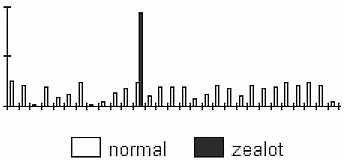|

Rational Ignorance and the Stupidity of the Centralized State
How many New Yorkers have ever seen an oil well? What percentage have ever driven across the continent or lived on a farm? How many have ever been to Alaska much less Guangzhou? Of course quite a few have, mostly those in the financial or political worlds. But the stereotype immortalized by Saul Steinberg's View of the World from 9th Avenue with the world beyond the Hudson reduced to a minor strip is all too accurate a reflection of the views of a vast number of Manhattanites.So why should such people have any voice in the use of force in places and communities they know virtually nothing about? The knowledge about our world that any one of us can have is a minute fraction of all that is known. While a formal description could be elaborated using the vocabulary of topology, Don Campbell described the nature of our knowledge most evocatively in his Fish Scale Model of Collective Omniscience in 1969.
What we know best are those things that directly affect our neighborhoods, our vocations and our avocations. The totality of human knowledge is the union of all our intersecting individual spheres. Economists call our relative lack of knowledge about issues more remote from us or of less importance to us "rational ignorance." We literally can't afford the time and energy to become expert in very much that is not related to our everyday lives.
Unfortunately, almost all of us are inclined to overrate our own understandings of various issues whether we really do understand them or not. It's sort of a relativistic effect: thoughts race around in our heads much more rapidly than they can be communicated and thus we are always looking in the past when we consider what others are communicating. In New Yorkers who are attracted to metropolitan life largely because they are bright and enjoy exchanging thoughts with others, this leads to a collective intelligence, which in many respects evolves faster than that of those out in the sticks. Unfortunately, it is disconnected from the data. And thus, in their own way the urban resident is as parochial with respect to the Rest of the World as they consider those who actually live and produce out in it.
Few New Yorkers have ever walked into a modern cornfield and seen how much more densely it's planted today than it was a generation ago. Few outside of commodity traders realize that today's farmer has to be a global businessman, watching weather and crop reports from Brazil and China, matching wits with those super-computer-aided commodity traders in Chicago and New York, using GPS-referenced satellite data to determine which parts of their fields need what inputs, and what petroleum costs are going to do to tractor and trucking and barge and anhydrous ammonia expenses. But those urban dwellers are all too prone to listen to and vote for those eco-socialists who will claim that the farmer is too stupid to make decisions to maintain the quality of the very land the life of his family depends on. And, because of numbers, through the force of centralized government, they can impose egregiously inappropriate and expensive rules on the rural populations.
A particularly costly example, which is facing a reality check right now, is the notion that Alaskans are incompetent to make their own decisions about their own resources. The vast spaces in the West and the North are virtually incomprehensible to someone who lives their life in 500 square feet stacked ten or twenty high, a million and a half on 23 square miles. Consider all of Alaska has 640,000 people in 570,000 square miles. Of course, most all of these are concentrated in the half dozen largest and more southerly cities. In the entire northern 312,000 square miles there is a total of about 30,400 people. That's equivalent to finding two people on the entire island of Manhattan. But even that does not convey how empty Northern Alaska is because those 30,000 people are mainly huddled in "cities" like Nome (population 3,500), Kotzebue (3,100) and Borrow (4,700). As an exercise, get Google Earth and fly over Alaska and try to find Prudhoe Bay. When you find it, back out to an altitude of 25 miles or so and fly around some over the tens of thousands of square miles of empty Siberian style tundra. It is totally wacko arrogance that urban populations who will never set foot in the state much less its arctic regions can veto the local's development of their much needed, by all of us, natural resources. Even 50 Prudhoe Bays would hardly be noticeable in the vast expanses and, horror of horrors, it might become an urban wasteland like Wyoming where the deer and the antelope (and the elk and the bison) literally roam among thousands of gas and oil pumps (each occupying about the space of a Manhattan apartment) in tens of thousands of square miles. Rational ignorance wielding irrational power leading to costly stupidity.
But rationality rarely stops politicians, whose bread and butter is force, from enlisting the ignorance of the many to overrule the considered judgment of the directly concerned few. Alternatively, there are many instances where the zealotry of an active few override the freedom of the rationally ignorant many. As I pointed out in an op-ed Criminalizing the Population, the state has a natural bias to expand by criminalizing more and more of its population's potential choices.
The zealotry of the eco-socialists is an example. The zealotry of the "public-health" nanny-socialist drug warriors like Bloomberg is another. Zealotry of the "anthropogenic global warming" crowd is another. For that matter, corn farmers and ADM getting horrendously market distorting subsidies for their - and tariffs against Brazilian - ethanol is yet another.
In my last Serf City column, I outlined some of the notions and tools underlying a multidimensional view of the world. A bunch of independent values defines a space of that many dimensions. One way to look at those values, of course, is a bar chart.
 Here
are two distributions. One shows a normal broad range of concerns and
correlated levels of knowledge and time on the various issues of
everyday life.
Here
are two distributions. One shows a normal broad range of concerns and
correlated levels of knowledge and time on the various issues of
everyday life.
The other portrays the absolute zealot, all of whose energies are focused on a single special interest. These two distributions represent the same total energy (sum of squares). But the one, the zealot, spends all his energies pushing his single issue, e.g., extending the drug war to nicotine, which, if it increases the power of the state, the politicians will embrace, while the majority of people leading normal lives don't have the time or interest until its too late and they find yet another freedom and right to self ownership, history.
We libertarians, such as those of us writing here in Serf City, are, of course, zealots for the freedoms this country and city used to be envied for.
As I write on this 4th of July, 2006, our day of remembrance for our freedoms past, let me close with a quote which applies all too accurately to those zealots working to deny the individual intelligence of each of us to make our decisions about those things we are rationally informed about because they matter most to us.
"We
must be ready to employ trickery, deceit,
law-breaking, withholding and concealing truth. We can and must write
in a language which sows among the masses hate, revulsion, scorn, and
the like, towards those who disagree with us."
-- Vladimir Ilyich Lenin, quoted in
Max
Eastman: Reflections on the Failure of Socialism
 |
|
||||
